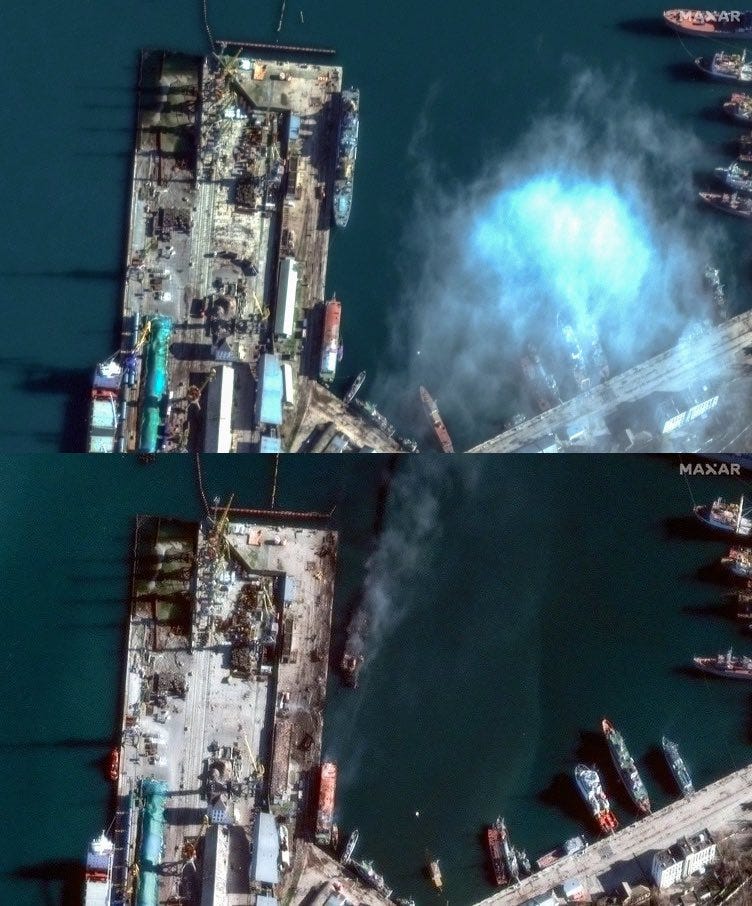
The compliance world has been all abuzz since Friday about a new Executive Order (EO) signed by President Biden giving the US Treasury new authorities to impose sanctions on foreign financial institutions that help Russia build up its war machine.
The war in Ukraine has been raging for the past nearly two years, and Russia is losing a lot of personnel and equipment. The latest Ukrainian strike hit the port of Feodosia on the Russia-occupied Crimean Peninsula and destroyed the Russian ship Novocherkassk. The Russians claim the ship was “damaged.” It looks to be a bit more than that!

So Russia is losing a lot of military equipment, and it needs to be replenished. Restocking is a priority, and the Wall Street Journal last month reported that Moscow is asking countries such as Pakistan, Egypt, Belarus, and Brazil to return parts, such as helicopter engines that Russia had previously exported, to replenish the equipment it has lost in Ukraine.
The new EO is trying to put the kebosh on Russia’s restocking efforts. It basically says that the United States can impose secondary sanctions on foreign financial institutions that help Russia replenish its war machine. The new EO amends the existing EO 14024, authorizing sanctions, including full blocks and restrictions on correspondent accounts, on foreign financial institutions that are either (1) facilitating significant transactions on behalf of persons designated for operating in certain key sectors of the Russian economy that support the country’s military-industrial base; or (2) facilitating significant transactions or providing services involving Russia’s military-industrial base, including those relating to specific manufacturing inputs and technological materials that Russia is seeking to obtain from foreign sources.
The definition of “significant transaction” is a bit spongy, but suffice it to say that OFAC is not in the habit of designating a bank for accidentally allowing one $1000 transaction with a shell company owned by Russia’s Rostec that it didn’t happen to detect. According to Treasury, as a general matter, some or all of the following factors may be considered: (a) the size, number, and frequency of the transaction(s); (b) the nature of the transaction(s); (c) the level of awareness of management and whether the transactions are part of a pattern of conduct; (d) the nexus of the transaction(s) to persons sanctioned pursuant to E.O. 14024, or to persons operating in Russia’s military-industrial base; (e) whether the transaction(s) involve deceptive practices; (f) the impact of the transaction(s) on U.S. national security objectives; and (g) such other relevant factors that OFAC deems relevant.
So if there’s evidence of willful and continued misconduct, a foreign financial institution can find itself cut off from the US financial system.
But what are these secondary sanctions?
In order to answer this question, we need to look at who must abide by US sanctions and what we mean by “US nexus.”
US persons, wherever they may be located, US permanent legal residents (LPRs), US companies and their branches, and any person who is physically located in the United States must comply with US sanctions. Foreign citizens visiting the United States must comply. So if you’re a foreign person on a business trip in New York, you cannot commit murder or theft, violating US laws; and US sanctions are also US law, so you cannot transact with a sanctioned client while you’re here.
Transacting in US dollars? That’s US jurisdiction.
In addition, if you are a non-US person you may not cause a US person to violate sanctions, and if you do, you yourself have violated US sanctions. So if a manager at a foreign subsidiary of a US company lies to its parent and causes the US parent to violate sanctions, that manager is in violation of US sanctions. Also, certain OFAC programs, such as Cuba, Iran, and North Korea, mandate foreign subsidiaries to be subject to the same restrictions as their US parents.
So, what happens if you’re a foreign person, transacting in your own country’s currency, and your country has not imposed sanctions on a Russian entity? If there’s no US nexus, you’re doing nothing illegal. So the United States came up with this concept of secondary sanctions that allow the designation of persons engaging in activities that would normally be subject to US sanctions if US jurisdiction or person was involved.
The United States cannot tell you what to do in your own country, using that country’s currency if no US nexus exists. But it can tell US persons that they’re no longer allowed to transact with you, forcing you to make a choice: either transact with the sanctioned Russian (in this case) entity, or transact with US companies.
Frankly, most firms and financial institutions would rather retain access to the US dollar and US customers than continue transacting with designated Russians, especially ones that are helping Vladimir Putin murder, rape, and torture Ukrainians, destroy Ukrainian cities, and kidnap Ukrainian children. That’s a huge reputational risk, and that’s why this new EO is so significant.
Sanctions aren’t just about blocking a company from the US dollar. They also have a “name and shame” aspect that tells everyone in what kind of dirty conduct the designated company has engaged. Even those firms that can legally transact with the company under secondary sanctions will probably choose not to. There are boycotts too that can cause loss of business and reputational damage.
So what happens if a foreign financial institution knowingly and willfully helps Russia’s military sector rebuild its military? Chances are it will either be blocked from the US dollar (and the global financial system) or it will at the very least face restrictions on its US correspondent activity.
This is not something any bank wants, and the Biden administration is hoping to discourage foreign financial institutions that still haven’t gotten the message from helping Russia continue its aggression against its neighbors.
Russia creates cutouts and front companies to evade sanctions and uses both witting and unwitting financial intermediaries to gain access to restricted goods and technologies. OFAC has provided plenty of guidance, advisories, red flags, and mitigation strategies for financial institutions and other stakeholders to help them remain compliant in this ever-changing world.
“And we will not hesitate to use the new tools provided by this authority to take decisive, and surgical, action against financial institutions that facilitate the supply of Russia’s war machine.” — Treasury Secretary Janet Yellen, 22 December 2023





Great article, Irene. Thanks for the analysis.
It will be interesting to watch how Treasury handles these, when, if, and how they apply them.